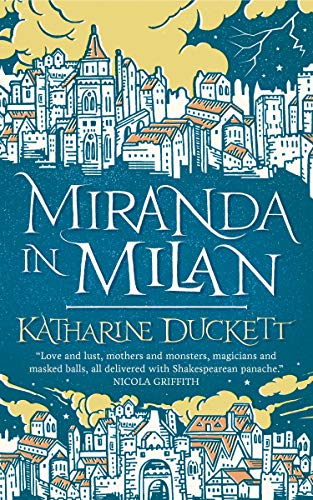
![]() Miranda in Milan by Katharine Duckett
Miranda in Milan by Katharine Duckett
I’ll be perfectly honest: The Tempest is not my favorite of William Shakespeare’s plays. It’s well-written, it has some fantastically quotable lines, and it contains insightful commentary about men and the pursuit of power (through various means, and of various types). But The Tempest only has one active female character, the sorcerer Prospero’s teenage daughter Miranda, and her functions are to (1) receive only the information her father deems appropriate, (2) remain obedient and chaste so that her virginity can be the strongest bargaining chip possible, and (3) be symbolically wedded to the king of Italy’s son in order to facilitate her exiled father’s return to Milan and, thus, to his status as Duke. She’s a means to an end; nothing more. There’s a lot of great stuff in The Tempest! It’s just, you know, that bit’s not great.
As modern authors tackle the characters, symbolism, and themes of The Tempest, however, I find my appreciation for the play-as-source-material grows. “Shift,” from Nalo Hopkinson’s short-story collection Falling in Love with Hominids, is one such example, bringing a fresh and necessary take on Caliban and Ariel. And in Katharine Duckett’s 2019 novella Miranda in Milan, she examines what might happen to Miranda once King Alonso has returned Prospero’s power and status and the audience’s applause has set him free. “Now my charms are all o’erthrown, / And what strength I have’s mine own, / Which is most faint,” he says, the veracity of which will be tested as Miranda leaves her island paradise behind for the cold stone walls of her Milanese ancestral home.
While foreknowledge of The Tempest is by no means a prerequisite for enjoying Duckett’s continuation of Miranda’s story, since key details from the play are incorporated into the novella when necessary, I do hope unfamiliar readers who enjoy this work will go back and experience the source material for themselves. It’s well worth reading.
Miranda is utterly unprepared for the life of a duke’s daughter: she’s uneducated in courtly etiquette and dress, along with even the most basic knowledge of how the world works; former-Duke Antonio, her uncle, stares at her but won’t speak to her; and the woman who actually runs the castle forces Miranda to wear a heavy lace veil at all times so that no one can look upon her face. Shunned by nearly every living resident of the castle, Miranda spends her time fondly (and not-so-fondly) remembering life with Caliban and Ariel, waiting fretfully for Prince Ferdinand’s summons to Naples for their legitimate wedding. The only kind person is a servant girl, Dorothea, who sees how “alone, and scared” Miranda is, and who offers friendship along with a little bit of witchcraft. But as winter drags on with no word from the prince, Miranda hears whispered rumors about the reasons behind her father’s exile to that unmapped island and sees how little of her own agency she’s been allowed to possess, and the steps she takes to gain control over herself have unimaginable consequences.
Duckett’s Miranda is curious, intelligent, and innocent, but by no means is she stupid or helpless. Her memories of growing up on the island reveal a tremendous capacity for learning and exploration of the natural world which was, unfortunately, heavily curbed and controlled by her father. Dorothea’s backstory and current situation emphasize the colonialism and post-colonialism aspects of The Tempest, asking Miranda directly what “civilization” means and whose definition of the term is understood to be correct, challenging this young woman of privilege to question the way her father views the world and its inhabitants as either inconsequential or fit only for subjugation. Prospero, himself, becomes even more terrifying as Miranda’s innocence falls away, and there are a number of female characters whose presence and contributions are essential to the story in ways I can’t possibly discuss without giving away the game entirely. Suffice to say, Duckett more than makes up for the dearth of women that came before, and does so in such a way that accurately portrays the structure of court life and social hierarchies in late sixteenth-century/early-seventeenth-century Italy. I still can’t believe she fit everything into a two-hundred-page novella.
Throughout Miranda in Milan, Duckett’s prose makes it easy to slip into the brave new world she creates, giving a familiar character new life without trying to mimic Shakespeare’s rhythm, style, and vocabulary. Her wordplay has a poetry and flow all its own, and the innuendo — particularly Dorothea’s sly jokes about “stiff drinks” and Miranda’s complete inability to pick up what she’s laying down — is period- and style-appropriate without feeling like a modern-day intrusion. And the inclusion of a masquerade ball, with its dizzying whirlwind of proper behavior, fashion, and glamour, echoes Prospero’s false masquerade in The Tempest while giving readers a look at what the real thing would have looked and felt like.
Miranda in Milan’s conclusion is lovely, setting characters on the best possible path after taking them through truly difficult and challenging circumstances. I enjoyed every plot twist, character decision, and sentence of this tremendously well-crafted novella. Highly recommended.



This sounds fascinating! Another one for the toppling-over TBR pile …
Luckily, it’s a novella, which are always easier to find time for. :)
Ah, you beat me to it! :D I also read this recently and kept meaning to review it. I loved it too. Could have happily read another 200 pages of it.
Oh, easily! Another 200 pages would have been most welcome. :D